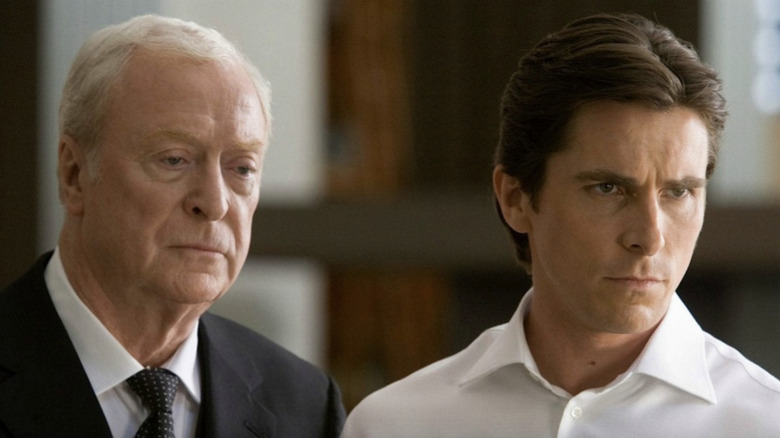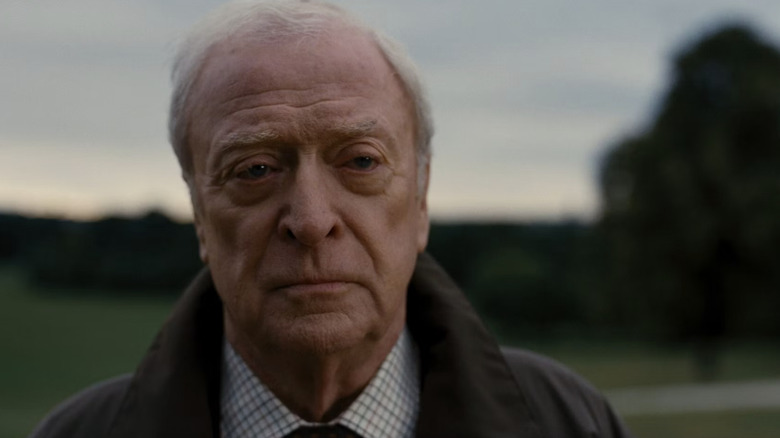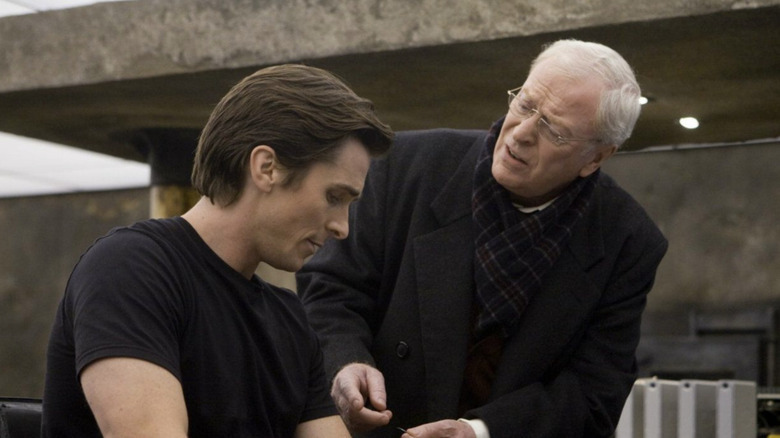Michael Caine Was On A Tight Deadline To Decide If He Would Play Alfred In Batman Begins
One of the smaller joys of watching a Christopher Nolan movie is waiting to see when Michael Caine will make his appearance. Aside from the intricate, ambitious plots you see in films like "Inception" or "Tenet," Michael Caine is one constant in the high-concept storm that is Nolan's filmography. No matter how big or small the role, Caine has worked with Nolan more than any other actor, beating out other frequent collaborators such as Cillian Murphy or Tom Hardy. The pair's working relationship started with "Batman Begins," released in 2005. Since that first role, the actor has become synonymous with the director's work. However, that may not have been the case if Michael Caine had not decided to join the Batman origin film as Alfred Pennyworth.
If there were any moral compass in Nolan's trilogy of Batman films, it's Alfred. Previous live-action iterations of the character had him relegated to a background role, whereas Nolan's version of Alfred is instrumental in helping Christian Bale's Bruce Wayne become Batman. Interestingly, Caine's involvement with the first film in "The Dark Knight Trilogy" came about through a tight deadline. As Caine explained in 2020, there was an urgency for the actor to become familiar with the material and join the film as Bruce Wayne's loyal butler and father figure. Funnily enough, all of this would be thrust upon the actor on the very same day he met Nolan.
A sense of urgency on the first meeting
In Empire's comprehensive history of "The Dark Knight Trilogy," Michael Caine told the story of how he first met the director, saying that Nolan had arrived at his house one morning with a script for a movie the director was working on. The actor was under the impression the script the director had with him was for Caine to hold onto and read overnight, and he politely said, "Okay, leave it with me, and I'll give you a call tomorrow."
However, he was completely unaware of the urgency and Nolan's intentions for Caine to read the script that very moment. As Caine puts it, Nolan's response was as blunt and matter-of-fact as possible (ironic, considering how densely packed and vague most of his films are): "No. I want you to read it now. And then I'm going to take the script away with me." On the same day that Caine met his future long-time collaborator, he would first read the script for "Batman Begins." As many others in the filmmaking landscape at the time had thought, the actor was surprised that Nolan would be taking on a blockbuster of this caliber, especially having come off of two small scale, personal thrillers:
"I was expecting a 'Memento'/'Insomnia'-style thriller. And I got 'Batman Begins.' Which completely took me by surprise. I thought that this was a big risk by Warner Bros. Giving this massive, expensive movie to a guy that directed two very small-budget thrillers. But I needn't have worried..."
Setting the standard for supporting characters
As it turns out, Michael Caine was apprehensive when Nolan initially pitched the film to him that day. The role of Alfred seemed surface level to him, as on the surface, Alfred is just "the butler." However, as it turns out, Caine's role in the trilogy is filled with some of the most profound (and also most quotable) moments of each of the three films. Whether it was the critical insight he provided on whatever rogue Batman was going up against, various bits of wisdom, or the history of the Wayne family Bruce never really got to know, Caine grounded the character in real human emotions. Nolan's version of Alfred Pennyworth also set a precedent for future comic book movies to provide more depth and humanity to supporting characters.
Even future actors who would step into the role, such as Jeremy Irons in "Batman v Superman" or Andy Serkis in "The Batman," portrayed the same empathetic and level-headed butler in different ways. Overall, Caine's joining the project after that fateful day led to future roles in every Nolan film after that point (it's still unknown whether or not Caine appears in "Oppenheimer"). Moreover, the actor also set a new standard for not only future iterations of Alfred, but for a more humanistic approach to help ground the fantastical world of grandiose comic book movies.


